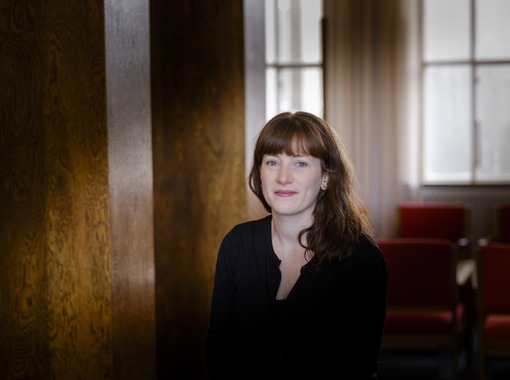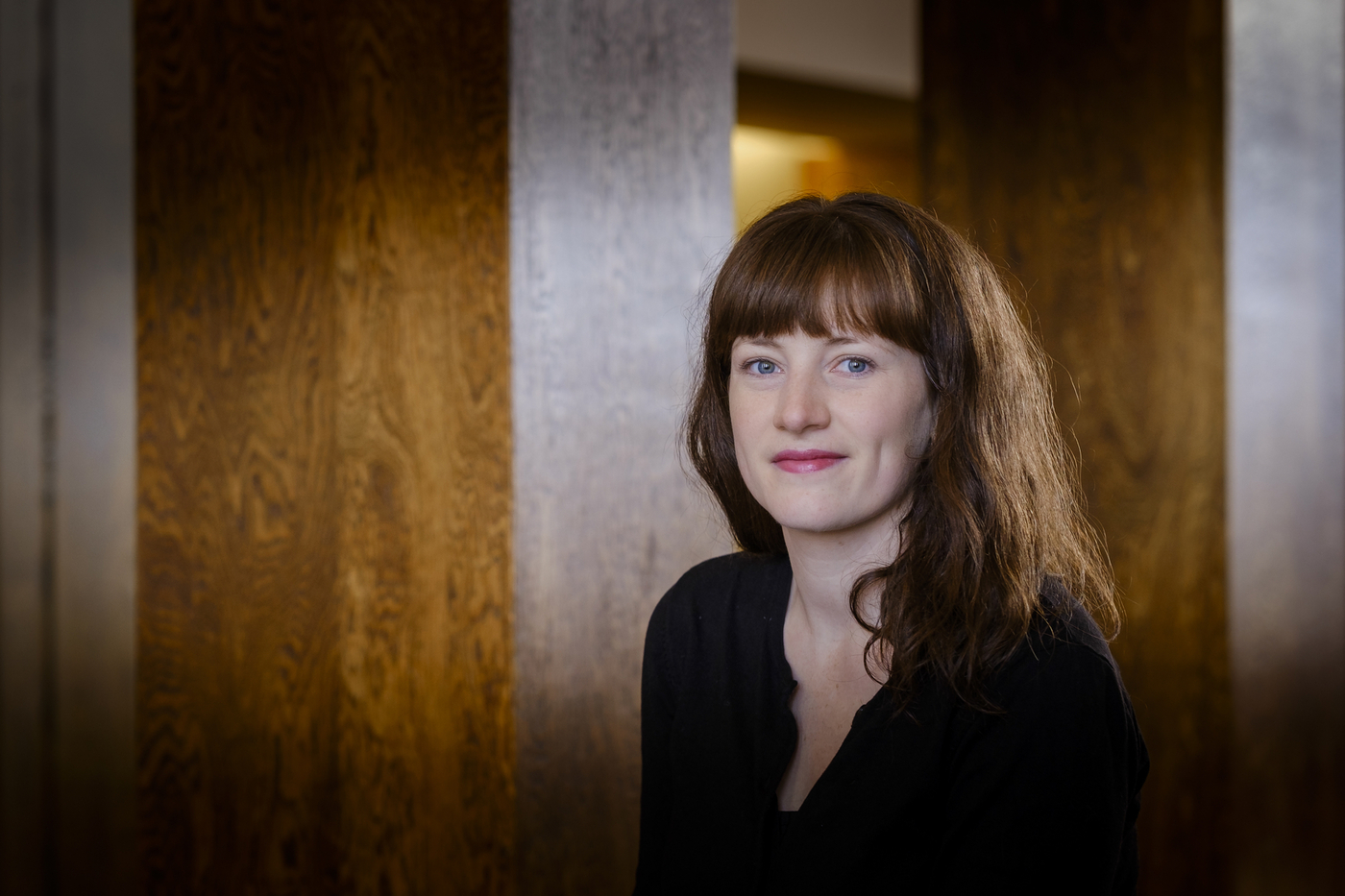Protests by upper secondary school students in the autumn of 2022 in support of victims of sexual violence, the #MeToo revolution, #FreeTheNipple and other social justice movements are the focus of a thesis by philosophy student Katrín Pálmadóttir Þorgerðadóttir. The thesis explores the impact that these movements had on the ethical standards and attitudes of young people surrounding love and sex.
"People sometimes think that philosophy is inaccessible and out of touch with the realities of ordinary people. While there is great value to be found in the various academic specialisations within philosophy, I believe it is no less important to practise philosophy that is relevant and accessible to people outside academia. I have found feminist research and theory, whether philosophical or otherwise, to offer the best explanation of people's lived experiences and a radical view of the world," says Katrín, explaining her research interests. Her thesis is part of a larger project on feminism, ethics and #MeToo, led by Eyja Margrét Jóhönnu Brynjarsdóttir, professor of ethics, and Nanna Hlín Halldórsdóttir, postdoctoral researcher in philosophy.
As well as her philosophy degrees, Katrín is also a qualified upper secondary school teacher and has taught at various levels of the education system. She points out that philosophy is connected to so many other subjects and that she herself enjoyed the challenge of using philosophy in her teaching in various ways. "I have a great interest in making better use of theoretical methods to analyse and understand the world we live in, but also to promote real positive change in our society," she adds.
The personal side of fighting inequality
Katrín points out that social justice movements of recent years, such as #MeToo, #FreeTheNipple and Beauty Tips, have raised public awareness of the prevalence of sexual violence and the manifestations of rape culture. There has also been widespread dialogue among young people about sexual abuse. For example, in the autumn of 2022, young survivors came forward to speak out about their experiences of sexual violence perpetrated by their peers, sparking protests by upper secondary schools students against the lack of action taken by school authorities and the justice system.
"This study aims to map the ethical values and expectations of young people aged 18-25 in Iceland concerning sex and intimacy. We will evaluate to what extent these public discussions have translated into knowledge and standards that young people apply in their own lives and relationships. Naturally, young people often have limited experience of romantic relationships, so it is interesting to investigate their expectations and ideas of intimacy and love and to think about where these ideas come from," explains Katrín.
Katrín is also interested in the generational differences that are often evident in movements campaigning for equality. "It's interesting to look at how political and ethical views are shaped in individuals and how people are influenced by dominant ideologies and discourse, language, technology and so many other factors. This study focuses on the personal side of fighting inequality, i.e. whether and how young people take ideas about ethics and equality on board and put them into practice in intimate relationships," she says.
Feminist philosophy has always explored the ethical aspects of love and sex
Feminist philosophy forms the theoretical foundation of the project. According to Katrín, this branch of philosophy has a long and rich history of engaging with ideas about the ethics of love, marriage and sex. "Grassroots feminist organisations and academic feminists have coined new terminology and developed new approaches to identify and understand these kinds of issues. This has also bled into wider conversations about the various nuances and complex power structures that can exist in unhealthy communication and relationships where sexual offences are committed," she points out.
"What sets this project apart is that we are looking at which ideas about ethical norms and standards are reflected in the way young people talk about love and sex and about ethical behaviour and responsibilities in intimate relationships," says Katrín.

Katrín adds that it could be argued that romantic relationships are a kind of grey area, where the normal ethical demands we make of other people do not apply. "In this grey area, we can accept the unique status of the romantic relationship, e.g. the mutual vulnerability and trust that we expect. There is also a certain lack of boundaries, in that we place considerably higher and more specific demands on our loved ones than on other members of society. Feminist moral philosophers have explored the ethical aspects of intimate relationships more thoroughly than most traditional moral philosophers, particularly in consideration of the gendered power imbalances that can exist or develop in romantic and sexual relationships," explains Katrín.
Interviews with young people shed light on responsibility in intimate relationships
Katrín's research involves a philosophical analysis of perspectives and terminology in this area, as well as interviews with young people, which will be conducted and analysed using phenomenological methods. "Phenomenological research interviews are based on intersubjectivity and philosophical interpretations rather than the one-sided interpretation of the researcher. This methodology can lend considerable depth to an interview, meaning that studies like this can hopefully make a significant contribution to mapping ethical attitudes and changes of attitude within society," explains Katrín.
In the interviews, she will attempt to identify how the interviewees understand various terms they have learnt and use to describe their own experiences and expectations. She will also look at how conscious they are of their own positions and of where they get their ideas about love and intimacy. "What sets this project apart is that we are looking at which ideas about ethical norms and standards are reflected in the way young people talk about love and sex and about ethical behaviour and responsibilities in intimate relationships," adds Katrín.
Katrín's project is still in the early stages, meaning that there are no findings as yet, but she reports that the interviews she has already conducted have been extremely interesting. "They provide, for example, a deeper insight into the debates and protests that took place in upper secondary schools in the autumn of 2022, when students demanded that action be taken to address the sexual violence that some students had experienced at the hands of their fellow students. I believe this demonstrates the importance of listening to the voices of young people when it comes to fighting inequality," she says.
Findings will aid the fight against sexual violence
Katrín argues that it is important for academics to explore the way in which recent public debates have affected young people's sense of morality in intimate relationships, in part to aid the fight against sexual violence in the future. "It is also important for fields like ethics and phenomenology to address current concerns in society and to respond to social changes with critical and scholarly approaches. Our focus will be on highlighting the knowledge and attitudes of young people, as well as producing data and findings that can be used for education and to further progress in this area."
In recent years, there has been a lot of research into sexual violence in intimate relationships between young people and sexual culture among adolescents, including studies by students and academics at UI. Findings suggest that pornification has had a significant impact on the attitudes and sexual behaviour of this demographic. "Ideas and behaviour like this could explain why perpetrators and victims can see the same incident so differently, due to conflicting and unrealistic ideas about intimacy, desire, consent and boundaries," she concludes.




